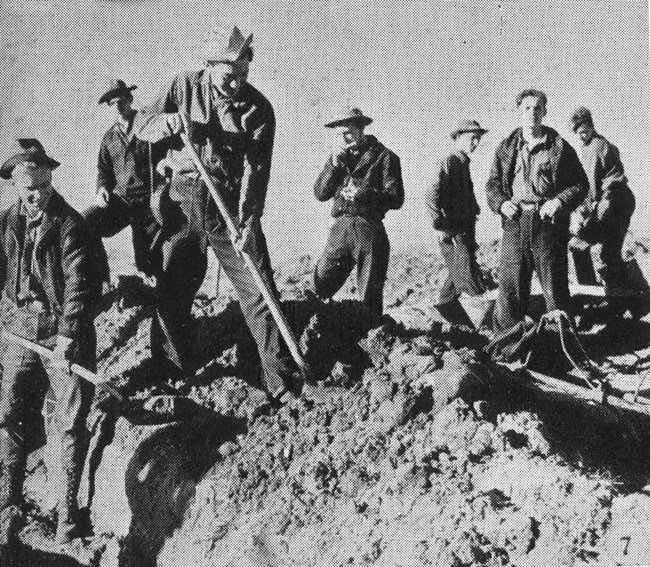The White Nostalgia of the CCC

In 1933, with the country deep in the Great Depression, the United States government created the Civilian Conservation Corps, a work program that gave young men jobs transforming the American landscape. They built trails and roads, fought fires, and maintained critical infrastructure, among many, many other projects.
“The CCC was absolutely massive,” says environmental economist Mark Paul of the New College of Florida. At its peak, it employed half a million workers—over its nine-year lifetime, the total figure was 3 million, about 5 percent of the US male population at the time. “So it’s really a kind of hallmark program in American history that provided youth with economic opportunity while bringing them close to nature,” he continues.
In 2020, we face massive unemployment and a host of environmental problems that need fixing: wildfires in the West, flood-prone areas along the Gulf of Mexico, all manner of dams on the verge of collapse. Nearly a century after the original CCC came into being, some folks argue it’s time to bring it back. So say Americans themselves: recent polling shows that 80 percent of Democrats and 74 percent of Republicans favor a return of the CCC. Joe Biden has proposed something akin to the CCC if elected: the Civilian Climate Corps. Workers would manage forests, restore ecosystems, and even remove invasive species. In September, Illinois Senator Dick Durbin introduced the RENEW Conservation Corps Act, which would spend $55.8 billion over five years to put a million Americans back to work, doing things like wildlife surveys and monitoring water quality. And last year, Ohio Representative Marcy Kaptur introduced the 21st Century Civilian Conservation Corps Act, which has yet to pass the House, but proposes rehabilitating environments and updating trails and facilities throughout the country’s natural spaces.
Kaptur sees some participants as working in their local communities, while others up for travel might move around the United States. “If we give them an opportunity to broaden their horizons, and at the same time restore America in some of its hidden corners and neglected places, what a great gift to the future,” she says. “I don’t know a single person—including my own father, who worked for the Civilian Conservation Corps as a very young man—who wasn’t changed and elevated by that experience.”
OK, we need to take a big step back here.
I like the CCC as much anyone who likes to spend time in the forest. But we need to recognize it for what it was. The CCC was a program to find work for poor people. In the 1930s, those people were mostly white. In 2020, they are not. What do you think would happen if large numbers of Black and Latino people were sent to rural Idaho and Montana to dig fire lines and plant trees? Actually, we have a good idea. It’s not the first time someone has thought of this. Part of the expansion of the safety net in the 1960s and early 70s was the Youth Conservation Corps. A friend of mine has a book coming out that explores these very questions and I will do a podcast about it when it is published. But here’s the short version–Black kids from Watts really did not want to go Idaho. And white Idaho really, really, really did not want these Black kids around. There was a lot of tension and some violence. The program just didn’t work.
There’s nothing wrong with the CCC. It was a nice agency. There are things we can learn here, though we have much more to learn from the PWA and WPA and TVA and other much larger New Deal programs. The CCC plays an outsized role in the public imagination of the New Deal because it was a certain type of young man doing a certain type of work in a certain type of place. Reviving the CCC is not going to return us to a nostalgia vision of 1934 (a weird year to be nostalgic for, but hey, if people have nostalgia for the Civil War, they can have nostalgia for the Great Depression I guess). It would create a whole series of very real issues that would have to be worked out, including racial hostilities. This is even besides the point of finding people who would actually want to go work these jobs, a real question. These questions are inherently racial questions given the affected populations and locations where a revived CCC would likely be working. Let’s not allow nostalgia to get in the way of working through the hardest questions we face.


